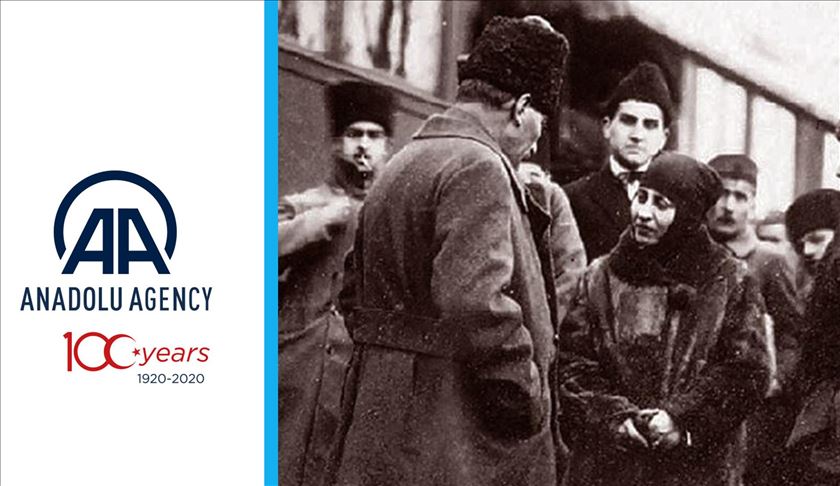Halide Edip Adivar: Anadolu’s name giver
Seeing Anatolia as key for national salvation, inspiring novelist Adivar named the agency after it amid foreign occupation

ANKARA
Anadolu Agency, Turkey’s leading news source, is marking its 100th anniversary with deep gratitude to Halide Edip Adivar, the woman who gave the agency its very name, served as a corporal in the War of Independence, and was the first Turkish novelist to write about war.
Adivar, a pillar of Turkish literature, was born in 1884 and spent her childhood with her grandparents. In 1893 she was enrolled at the Uskudar American College for Girls but dropped out a year later.
She was tutored in Arabic, English, French, and music. Encouraged by her teachers, she translated 19th-century American writer John S.C. Abbot’s book The Mother at Home, which eventually won her the Order of Compassion prize from Sultan Abdul Hamid II.
In 1901, she graduated from college and was wed to Salih Zeki Bey, who used to teach her math. Pleased with Japan’s victory over Russia in 1904-1905, she named one of her sons after Japanese Admiral Togo Heihachiro for his pivotal role in the war.
She started to write for several newspapers and magazines but faced repeated threats from those who disagreed with her. Later, worried that she could be killed during the March 31, 1909 uprising, she left Turkey for Egypt but came back the following year.
At the instruction of the education minister, she started teaching at schools for girls and served as an inspector for private schools. In this period, her observations in the Istanbul suburbs inspired her to write the novel Sinekli Bakkal, later published in London under the title The Clown and His Daughter.
During the Balkan Wars of 1912-1913, she established the first women’s association in a bid to boost women's participation in social life and education. She then went to Syria to establish and arrange schools in Beirut and Damascus.
In 1917, she wrote her first play and started lecturing in Western literature in Istanbul.
After the city of Izmir, on the Turkish Aegean, was occupied on May 15, 1919, Adivar took part in rallies in Istanbul against the occupation. Her speech in Uskudar, in Istanbul’s Asian side, drew wide acclaim and was not forgotten. With her fierce writings, she helped establish a resistance.
In this period, Adivar played a role in smuggling weapons to Anatolia – central Turkey – while Istanbul was under occupation. In 1920, she moved to Anatolian soil and joined the resistance along with Dr. Adnan Adivar, her second husband.
In Anatolia, while speaking to Yunus Nadi Bey, a Turkish journalist and politician, Halide Edip Adivar brought up the idea of founding the country’s first news agency. At her urging, the two agreed to name it Anadolu (Anatolia) Agency, an outlet to tell the story of Turkey’s justified battle to throw off the yoke of occupation forces.
As Istanbul was under occupation, and the country’s salvation depended on the developments and will of the Anatolia heartland, they settled on this as the best name for the agency. On April 6, 1920, Anadolu Agency was officially established following the instructions of Mustafa Kemal Ataturk, the founding father of the Republic of Turkey.
While contributing to Yunus Nadi’s Istanbul daily Hakimiyet-i Milliye daily, Adivar also translated foreign dailies and became director of the Ankara branch of the Red Crescent (Kizilay).
During Turkey’s War of Independence, at the 1921 Battle of Sakarya, she became a corporal and wrote reports about the oppression and harm the Greek army inflicted on Turks before their withdrawal from the Anatolian territory.
After being promoted to sergeant, she wrote classic works such as Ateşten Gömlek, Vurun Kahpeye, and Dağa Çıkan Kurt.
Following the declaration of the republic, Adivar continued her life as a writer and contributed to many newspapers and magazines.
After the Progressive Republican Party (Terakkiperver Cumhuriyet Firkasi) – co-founded by her husband – was shut down by the government of Prime Minister Ismet Inonu, she left Turkey in 1925 amid emerging political disagreements.
She lived abroad until 1939 and lectured at universities and conferences in Britain, France, and the U.S. In 1935, she went to India to support the campaign to establish Camia-i Milliye, a university for Muslims.
In 1940, she taught English literature at Istanbul University, and in 1950 was elected as a lawmaker of the Democrat Party. However, she resigned four years later due to political disagreements and returned to her literary career.
On Jan. 9, 1964, she passed away at age 82 and was buried in Istanbul, leaving behind a legacy of dozens of works for future generations. Peyami Safa, a leading Turkish writer of the period, called Adivar the “only Turkish war novelist,” and acclaimed poet Necip Fazil Kisakurek spoke highly of her unique works.
She also translated both George Orwell’s Animal Farm and Shakespeare’s Hamlet into Turkish.
Anadolu Agency website contains only a portion of the news stories offered to subscribers in the AA News Broadcasting System (HAS), and in summarized form. Please contact us for subscription options.


